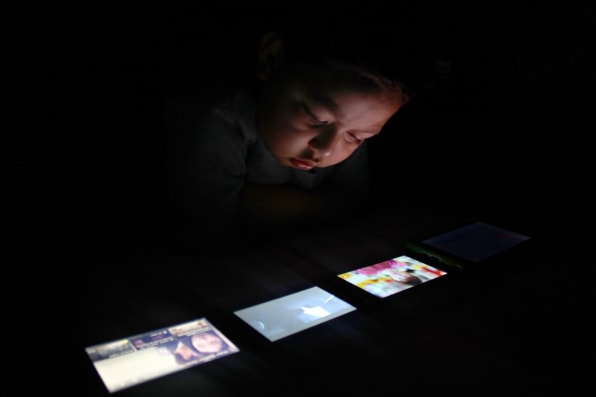03.26.18 | SECOND SHIFT
We asked hundreds of parents how they manage (and don’t manage) their kids’ screen time.
The answers were candid, scary–and sometimes hopeful.

BY KATHLEEN DAVIS LONG READ
“I am tethered to my smartphone for both work and entertainment, as
is my husband. It’s omnipresent and an extension of our bodies. Not
wanting to be left out, my 16-month-old son takes the baby monitor,
holds it in his hands, and peers at it like it is a smartphone. It is the
cutest/most pathetic thing.”
That’s the eerie image a New York mom of two paints of her small
child’s burgeoning tech addiction. Like most parents, that mom lives a
waking life seeped in almost non-stop screen time (an average
American adult spends about 11 hours a day looking at a screen ). She,
like many modern parents, sees her own tech dependency reflected in
her children’s habits. She doesn’t always like what she sees.
Even as we learn about the potential pitfalls of our increasingly
technology-addled lifestyles, our dependence on tech shows little sign
of waning. Still, the anti-screen time drumbeat is getting louder,
especially when it comes to kids.
In November, Chamath Palihapitiya, a venture capitalist who was an
early employee at Facebook, said that the social network was “ripping
apart the social fabric of how society works.” Tristan Harris, a former
product manager at Google, told Wired that Apple, Google, Facebook,
Snapchat, Twitter, and Instagram design products to “hijack” our time
and attention. In January, two Apple investors asked the company to
study the health effects of its products on children.
Then, last month, an unprecedented alliance of former employees from
some the most powerful tech companies–including Apple, Google, and
Facebook–formed the Center for Humane Technology. In partnership
with the nonprofit media watchdog group Common Sense Media, the
group plans to lobby against addictive tech, and is kicking off with a $7
million “Truth about Tech” ad campaign that they plan to deliver to
55,000 public schools.
Related: How Our Tech Addiction–And Constant Distraction–Is A
Solvable Design Problem
That the very people who championed the technology to which we
are addicted are now banding together to warn parents about the monster
they’ve created is perhaps a sign that more people are starting to
question tech’s outsized role in our lives. But it feels a bit farfetched that
an ad campaign, no matter how well-intentioned, can really help curtail
our society’s addiction–especially when kids these days are being
introduced to screens at such a young age. In her book, The Art of Screen
Time Anya Kamenetz cited a 2011 survey of 9,000 preschoolers (3- to 5-
year-olds) that found that young kids spend about four hours a day in
the company of (all types of) screens.
To find out what parents think about their kids’ use of tech, Fast
Company surveyed nearly 400 parents. We tried to look at the issue from
all angles, from the amount of screen time kids get to have, to the types
of devices kids use, to parents’ regrets about their kids use of
technology, to the benefits that technology can provide to families.
We also asked parents how they feel about witnessing their own tech
addiction reflected in their kids’ behavior. Those were, perhaps, the
most telling answers of all.
The parents who answered our survey hail from all over the U.S. (and a
few other countries). Their professions span many industries, including
marketing, public relations, education, finance, therapy, video
production, law, medicine, and business. Most participants have one or
two children, ranging from 7 months to 18 years old. The majority of
participants’ kids are between 3 and 11 years old; in other words, these
parents are in the thick of parenting.
Obviously, this self-selected group of Fast Company readers isn’t a
conclusive sample–but, along with expert research, these parents’
insights help provide a snapshot of the worries that burden parents in
our tech-dependent era.

Related: A Smarter Way To Think About “Screen Time” And Kids’ Tech
Use